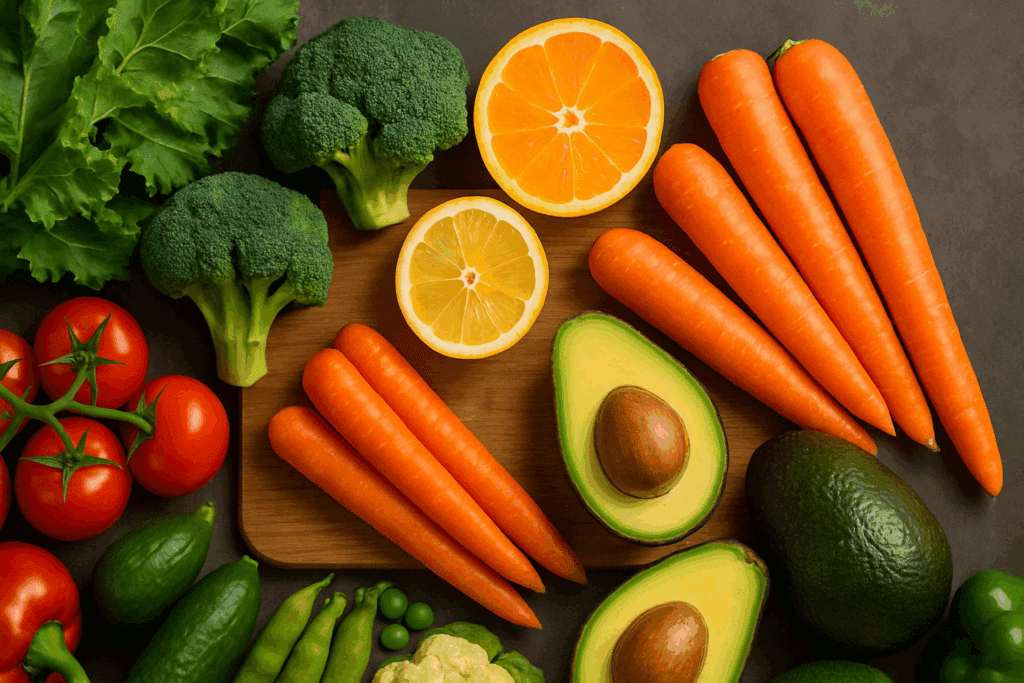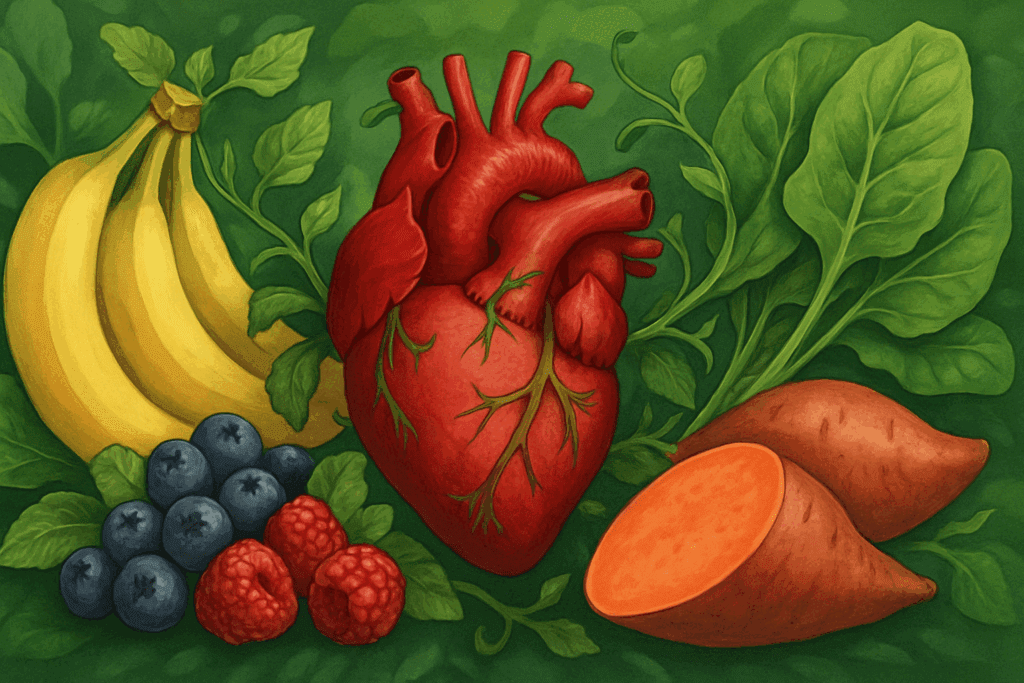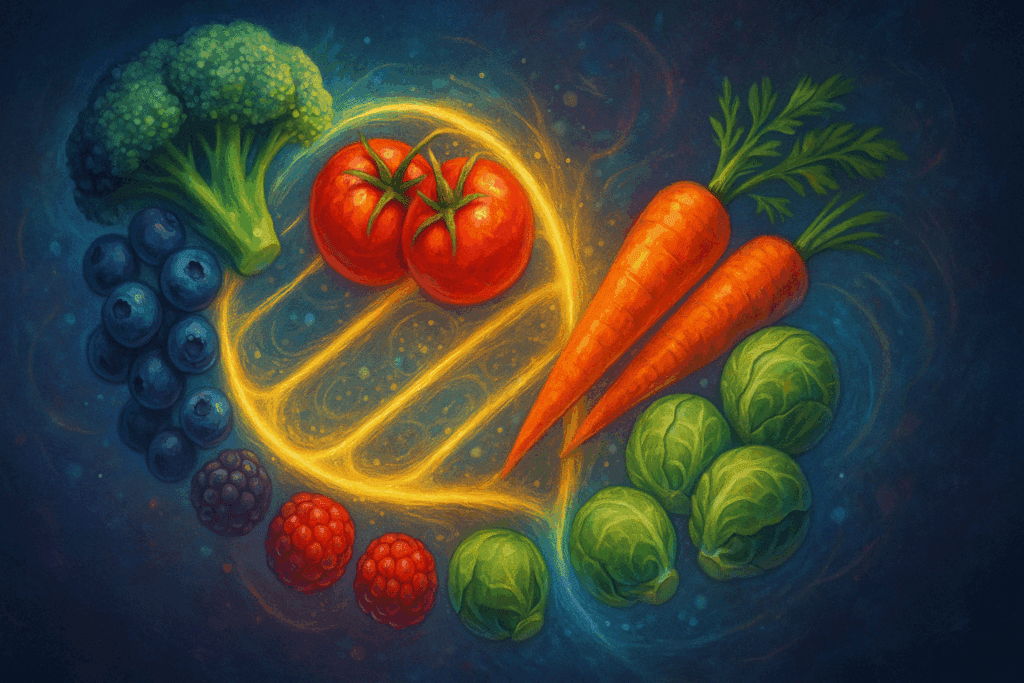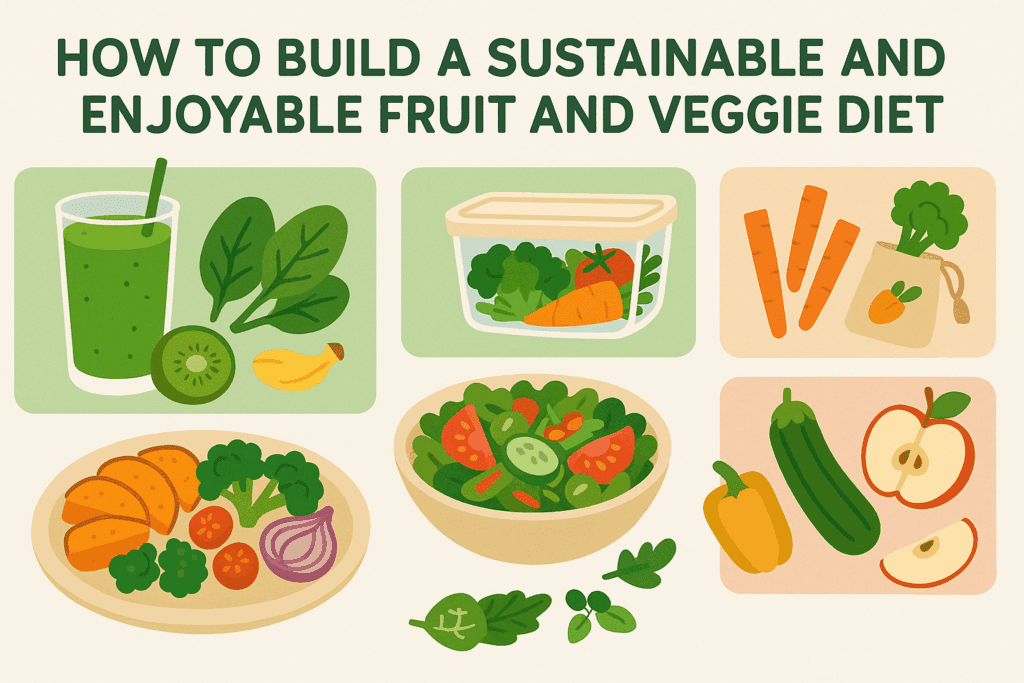In the landscape of modern nutrition, few recommendations are as universally endorsed as increasing one’s intake of fruits and vegetables. A diet rich in plant-based foods has long been associated with better health outcomes, improved energy levels, and greater resistance to chronic disease. But what exactly is it about a fruit and vegetable diet that makes it so beneficial? What mechanisms drive these effects, and how can we optimize our consumption to gain the maximum benefits? This article delves into the current scientific understanding of how a fruit and veggie diet can transform your health, shedding light on the biological, physiological, and psychological factors involved. For anyone wondering what is healthy about fruit or why healthy food fruits and vegetables are central to public health guidelines, the answers are as enlightening as they are actionable.
You may also like: Best Foods for Cognitive Function: What Science Reveals About Brain Nourishment, Focus, and Mental Clarity

Understanding the Nutritional Density of Fruits and Vegetables
Fruits and vegetables are nutritional powerhouses, packed with vitamins, minerals, antioxidants, and phytochemicals that play key roles in maintaining health. Unlike processed foods that are high in calories but low in nutrients, fruits and vegetables provide a high nutritional return for a relatively low caloric investment. One of the most compelling reasons to follow a fruit and vegetable diet is this dense concentration of nutrients, which supports every bodily system from the immune response to brain function.
In particular, vitamins A, C, and K, as well as folate and potassium, are found in abundance in many fruits and vegetables. These nutrients contribute to vital physiological processes, including cell repair, inflammation control, and cardiovascular health. Additionally, the fiber content found in fruits and veggies is essential for digestive health, helping to regulate bowel movements, reduce cholesterol, and support the microbiome. The microbiota within the gut play a significant role in mental health, immune function, and even weight regulation, meaning the benefits of eating fruit and vegetables extend far beyond the digestive tract.
A fruit and veggie diet is also rich in polyphenols and flavonoids, compounds that reduce oxidative stress and may slow cellular aging. These substances are especially abundant in colorful produce like berries, red cabbage, kale, and citrus fruits. By reducing inflammation and combating free radicals, these compounds can lower the risk of chronic diseases, including cancer and neurodegenerative disorders.

Impact on Heart Health and Blood Pressure Regulation
A consistent body of scientific literature supports the role of a fruit and vegetable diet in reducing the risk of cardiovascular disease. This protective effect stems from a combination of reduced sodium intake, increased potassium intake, and the antioxidant effects of plant-based compounds. Potassium, which is found in bananas, sweet potatoes, spinach, and avocados, helps to counteract the effects of sodium on blood pressure. This mineral assists in the dilation of blood vessels, improving circulation and reducing the workload on the heart.
Further, the soluble fiber found in many healthy fruits and veggies binds to cholesterol particles in the digestive system, helping to eliminate them from the body. This mechanism contributes to lower LDL (“bad”) cholesterol levels and can improve HDL (“good”) cholesterol ratios. Over time, these effects translate into decreased arterial plaque buildup, enhanced blood vessel flexibility, and lower overall cardiovascular risk.
Studies such as the Dietary Approaches to Stop Hypertension (DASH) trial have demonstrated that diets high in fruits and vegetables lead to significant reductions in blood pressure within just a few weeks. This makes a fruit and vegetable diet a frontline strategy for both preventing and managing hypertension. Given the prevalence of high blood pressure globally, especially in aging populations, the dietary shift toward plant-based meals is not just a recommendation but a public health necessity.

Supporting Healthy Metabolism and Weight Management
Weight control is often the most visible and immediate concern when it comes to diet, and a fruit and vegetable diet can be highly effective in promoting healthy weight loss and long-term weight maintenance. The high fiber and water content in fruits and vegetables contributes to satiety, helping individuals feel full longer and reducing the likelihood of overeating. Moreover, the low energy density of most fruits and veggies allows for larger portion sizes without a corresponding increase in calorie intake.
Incorporating a wide range of healthy fruits and veggies into meals also helps regulate blood sugar levels, particularly when paired with whole grains and healthy fats. This reduces insulin spikes and crashes, thereby decreasing cravings and improving energy consistency throughout the day. For those managing insulin resistance or prediabetes, the inclusion of non-starchy vegetables and low-glycemic fruits can be particularly beneficial.
Emerging evidence also points to the role of plant-based diets in supporting metabolic flexibility—the body’s ability to switch efficiently between burning carbohydrates and fats for energy. This is critical for sustaining energy levels during physical activity and supporting long-term metabolic health. By encouraging the development of lean muscle mass, reducing visceral fat, and enhancing insulin sensitivity, a fruit and veggie diet offers multifaceted metabolic advantages.

The Psychological Benefits of Eating More Plants
Beyond the physical advantages, eating fruit and eating vegetables can have a profound impact on mental health. A growing number of studies are linking higher fruit and vegetable intake with reduced symptoms of depression, anxiety, and stress. While the exact mechanisms remain under investigation, several plausible explanations have been proposed. For one, the anti-inflammatory and antioxidant properties of fruits and vegetables may help protect the brain from oxidative damage that can contribute to mood disorders.
Additionally, certain fruits and vegetables contain precursors to neurotransmitters—such as tryptophan, tyrosine, and folate—which support the production of serotonin, dopamine, and norepinephrine. These brain chemicals regulate mood, motivation, and emotional resilience. Leafy greens, citrus fruits, berries, and cruciferous vegetables are particularly rich in these compounds. The gut-brain axis further underscores the psychological benefits of healthy food fruits and vegetables. By promoting a diverse and balanced gut microbiome, a plant-rich diet helps foster emotional balance and cognitive performance.
Moreover, the act of preparing and consuming fresh, colorful meals can itself be a form of mindfulness and self-care. Taking time to appreciate the textures, flavors, and aromas of natural foods creates a more intentional eating experience, one that nourishes both body and mind. This approach contrasts sharply with the fast-paced, convenience-driven food culture that contributes to chronic stress and disordered eating.

Reducing Cancer Risk Through Phytonutrient Power
While no single food can prevent cancer, a diet rich in fruits and vegetables is consistently associated with a reduced risk of various cancers. This association is particularly strong for cancers of the digestive tract, such as colon and stomach cancer, but extends to breast, lung, and prostate cancer as well. One of the primary reasons for this protective effect is the presence of phytochemicals, such as glucosinolates in cruciferous vegetables, lycopene in tomatoes, and anthocyanins in berries.
These compounds influence gene expression, enzyme activity, and hormonal balance in ways that may deter cancer development. For example, cruciferous vegetables like broccoli and Brussels sprouts contain sulfur-containing compounds that activate detoxification enzymes and promote apoptosis (programmed cell death) in cancerous cells. Carotenoids found in carrots, sweet potatoes, and apricots protect DNA from oxidative damage and enhance immune surveillance against abnormal cells.
Additionally, the high fiber content in a fruit and vegetable diet plays a crucial role in maintaining colon health by increasing stool bulk, reducing transit time, and binding potential carcinogens for elimination. Fermentable fibers also produce short-chain fatty acids like butyrate, which have anti-inflammatory and anti-cancer properties. Altogether, the evidence supports the idea that the synergy of nutrients in healthy fruits and veggies can collectively reduce the initiation and progression of cancer.

Improving Skin Health and Cellular Longevity
Skin is often viewed as a reflection of internal health, and there is growing recognition that dietary patterns significantly influence skin appearance and aging. A diet high in fruits and vegetables can improve skin hydration, elasticity, and resistance to environmental damage. The antioxidants present in these foods neutralize free radicals generated by UV exposure, pollution, and metabolic processes, thereby preventing premature aging and reducing the risk of skin cancers.
Vitamin C, abundant in citrus fruits, bell peppers, and strawberries, is essential for collagen synthesis—the structural protein that maintains skin firmness and elasticity. Vitamin A, found in leafy greens and orange-colored vegetables, supports skin cell turnover and repair. These nutrients, along with polyphenols and healthy fats, form a defense matrix that helps maintain youthful, resilient skin.
Furthermore, plant-based diets have been linked to reduced incidence of acne and other inflammatory skin conditions. This may be due to the anti-inflammatory properties of phytonutrients as well as the avoidance of high-glycemic, processed foods that can trigger hormonal fluctuations and sebum production. As with other systems in the body, the skin benefits most when a diverse array of healthy fruits and veggies is consumed regularly and consistently.

How to Build a Sustainable and Enjoyable Fruit and Veggie Diet
Transitioning to a fruit and vegetable diet need not be daunting or restrictive. The key to long-term adherence is variety, preparation, and personalization. Incorporating produce across all meals—from spinach in morning smoothies to roasted vegetables at dinner—helps ensure nutrient diversity and palatability. It is also important to explore both raw and cooked preparations, as cooking can enhance the bioavailability of certain nutrients, such as lycopene and beta-carotene.
Seasonal and locally grown produce often offer better flavor and nutrient profiles, while supporting sustainable agriculture. Shopping at farmers’ markets, joining a community-supported agriculture (CSA) program, or growing your own herbs and greens can enhance your connection to food and make healthy eating more engaging. Including a colorful array of produce on your plate also increases the likelihood of achieving a broad spectrum of nutrients.
Planning ahead and meal prepping can eliminate barriers to daily fruit and vegetable consumption. Pre-cutting veggies for snacks or salads, freezing fruit for smoothies, and keeping healthy dips like hummus or guacamole on hand can simplify the process. For those on a budget, frozen and canned vegetables with no added salt or sugar are viable and nutritious alternatives. The goal is consistency, not perfection, and every small step toward eating more healthy fruits and veggies adds up over time.
FAQ: Fruit and Vegetable Diet and Its Health Benefits
1. How can a fruit and vegetable diet contribute to long-term health?
A fruit and vegetable diet offers numerous long-term health benefits. Regularly eating fruits and veggies is linked to a reduced risk of chronic diseases such as heart disease, diabetes, and some cancers. By incorporating a wide variety of healthy fruits and vegetables, the body gets an abundance of vitamins, minerals, and antioxidants that are essential for overall health. For example, healthy food fruits and vegetables, rich in fiber, can promote healthy digestion, while antioxidants in fruits may help reduce inflammation. Additionally, eating vegetables such as leafy greens is a great way to support healthy skin and eye health. The more consistently a person consumes a balanced fruit and veggie diet, the better the chances of reducing the risks associated with aging and maintaining vitality.
2. What makes eating fruits and vegetables healthy for the body?
Eating fruits and vegetables is healthy for the body for several reasons. First, they are packed with essential nutrients such as vitamins A, C, and K, which help strengthen the immune system. For example, fruits like oranges and strawberries are rich in vitamin C, which helps in collagen formation and supports immune health. Vegetables like spinach and kale are loaded with vitamin K, important for bone health. Furthermore, healthy fruits and veggies contain natural sugars that are much better for blood sugar regulation than processed sugars. By reducing processed food intake and focusing on a fruit and vegetable diet, one can reduce calorie consumption while still receiving essential nutrients. This can contribute to weight management and the prevention of obesity-related conditions.
3. What role does a fruit and veggie diet play in mental clarity and focus?
A fruit and veggie diet can have a profound impact on mental clarity and focus. Many fruits and vegetables are rich in nutrients like omega-3 fatty acids, B-vitamins, and antioxidants that support brain function. For instance, leafy greens like spinach and kale are high in folate, a B-vitamin that has been linked to improved cognitive function. Healthy food fruits and vegetables, such as berries, can also help enhance memory and concentration due to their high levels of antioxidants. Additionally, eating vegetables such as sweet potatoes, which are high in vitamin B6, can promote healthy nerve function. A consistent intake of a well-balanced fruit and veggie diet could therefore lead to improved mental performance over time, enhancing both short-term focus and long-term cognitive health.
4. Can a fruit and vegetable diet help in weight management?
A fruit and vegetable diet is extremely beneficial for weight management due to the low-calorie and high-fiber content of most fruits and veggies. The high water content in many fruits, such as watermelon, can help with hydration and satiety, reducing the need for unhealthy snacks. Additionally, the fiber found in healthy fruits and vegetables plays a key role in digestive health and helps keep you feeling full longer. This makes it easier to manage calorie intake and avoid overeating. By replacing calorie-dense, processed foods with fresh fruits and vegetables, one can achieve and maintain a healthy weight without feeling deprived. As part of a balanced diet, incorporating healthy fruits and veggies is an effective strategy for managing weight over the long term.
5. What is the relationship between eating vegetables and digestive health?
Eating vegetables is key to maintaining digestive health. Many vegetables, such as broccoli, Brussels sprouts, and carrots, are rich in fiber, which promotes regular bowel movements and supports healthy digestion. Fiber helps bulk up stool and facilitates its smooth passage through the digestive tract. A fruit and vegetable diet not only provides fiber but also various compounds such as prebiotics that encourage the growth of beneficial gut bacteria. These bacteria are essential for a healthy gut microbiome, which plays a role in overall digestion and nutrient absorption. Therefore, including a variety of vegetables in your diet can help reduce the likelihood of digestive problems like constipation and bloating while supporting a healthy gut environment.
6. How can fruits and vegetables help in managing blood sugar levels?
Fruits and vegetables play a significant role in managing blood sugar levels, especially when integrated into a balanced diet. They are low in calories and high in fiber, which slows the absorption of sugar into the bloodstream, helping to prevent spikes in blood glucose. For instance, vegetables like spinach and cucumbers are low on the glycemic index, making them excellent choices for maintaining stable blood sugar levels. Fruits like berries, with their high fiber content, are also great for blood sugar control. By prioritizing a fruit and veggie diet, individuals can reduce the risk of developing insulin resistance and type 2 diabetes, especially when these foods replace processed, high-sugar snacks.
7. Can eating fruit and vegetables reduce the risk of chronic diseases?
Yes, a diet rich in fruit and vegetables can significantly reduce the risk of chronic diseases. Studies have shown that the antioxidants, vitamins, and minerals found in healthy fruits and veggies help protect the body against oxidative stress and inflammation, which are key contributors to chronic conditions like cardiovascular disease, certain cancers, and metabolic disorders. Regularly eating a variety of fruits and vegetables ensures that the body is receiving a diverse range of nutrients, each contributing to overall health. For example, cruciferous vegetables like broccoli and cauliflower contain compounds that have been shown to reduce the risk of certain cancers. Thus, maintaining a fruit and veggie diet is one of the most effective preventive strategies against chronic disease.
8. What are the mental health benefits of eating healthy fruits and veggies?
Eating healthy fruits and veggies can have a profound impact on mental health. Research suggests that the nutrients found in fruits and vegetables, such as folate, vitamin C, and magnesium, can play a role in alleviating symptoms of depression and anxiety. For instance, folate, found abundantly in leafy greens like spinach and kale, has been linked to improved mood regulation. Additionally, the antioxidants in fruits such as blueberries and strawberries may reduce oxidative stress, a factor that contributes to mental health issues. By incorporating a diverse range of healthy food fruits and vegetables into your diet, you can support brain health and mental well-being, potentially boosting mood and emotional resilience.
9. Are there any specific fruits and vegetables that provide extra immune-boosting benefits?
Certain fruits and vegetables are particularly beneficial for boosting the immune system. Citrus fruits, such as oranges, grapefruits, and lemons, are loaded with vitamin C, a key nutrient for immune function. Additionally, vegetables like bell peppers and broccoli are also high in vitamin C. For immune support, leafy greens like kale and spinach are rich in vitamin A, which plays a vital role in immune response. The antioxidants found in tomatoes and carrots can also help protect the body from harmful pathogens. By focusing on a diet rich in these immune-boosting fruits and vegetables, you can enhance your body’s natural defenses and improve overall health.
10. How can a fruit and vegetable diet support skin health?
A fruit and vegetable diet supports healthy, glowing skin through the antioxidants, vitamins, and hydration it provides. For example, vitamin C-rich fruits like oranges and strawberries are essential for collagen production, which helps maintain skin elasticity and prevent wrinkles. Vegetables such as carrots and sweet potatoes are rich in beta-carotene, which the body converts to vitamin A, promoting healthy skin cell turnover. Additionally, the high water content in fruits like cucumbers and melons helps hydrate the skin from the inside out. By making fruits and vegetables a regular part of your diet, you can improve skin texture and complexion, leading to a youthful and radiant appearance.
Final Thoughts: Why Fruits and Vegetables Are Healthy Investments in Your Future
A fruit and vegetable diet is far more than a short-term wellness trend. It is a scientifically grounded, evolutionarily compatible way of eating that supports nearly every dimension of health. From cardiovascular protection and metabolic balance to emotional well-being and skin vitality, the benefits of eating fruit and eating vegetables are both profound and far-reaching. These foods are not just sustenance; they are bioactive tools that communicate with our cells, regulate our physiology, and support resilience against disease.
The question is no longer what is healthy about fruit—the better inquiry is how to make these health-promoting foods a central and consistent part of our lives. The path forward lies in reimagining meals as opportunities for nourishment, not restriction. By embracing the rich textures, vibrant colors, and diverse flavors of healthy food fruits and vegetables, we invest not only in our current well-being but in the longevity and quality of our future health.
Incorporating a wider range of healthy fruits and veggies can start with something as simple as adding a new vegetable to your plate each week or swapping a processed snack for a fresh piece of fruit. These small decisions accumulate into significant shifts, ones that science increasingly confirms will yield measurable health improvements. In a world flooded with complex diet advice, returning to nature’s original nutrition source—whole fruits and vegetables—offers a beautifully simple, evidence-based strategy for lifelong vitality.
Was this article helpful? Don’t let it stop with you. Share it right now with someone who needs to see it—whether it’s a friend, a colleague, or your whole network. And if staying ahead on this topic matters to you, subscribe to this publication for the most up-to-date information. You’ll get the latest insights delivered straight to you—no searching, no missing out.
plant-based nutrition, antioxidants and chronic disease, dietary fiber benefits, micronutrient-rich foods, gut microbiome health, cardiovascular nutrition science, vegetable-based recipes, polyphenol-rich foods, natural anti-inflammatory foods, whole food nutrition, cancer prevention diet, brain health and nutrition, DASH diet principles, fiber and weight loss, seasonal eating habits, cooking methods for nutrient retention, local produce benefits, hydration and skin health, serotonin and diet, personalized nutrition strategies
Further Reading:
The benefits of fruits and vegetables
What Happens to Your Body When You Eat Enough Fruits & Vegetables
Disclaimer: The content published on Better Nutrition News (https://betternutritionnews.com) is for informational and educational purposes only. It is not intended as a substitute for professional medical advice, diagnosis, or treatment. Always seek the guidance of a qualified healthcare professional before making any changes to your diet, nutrition, or wellness practices. The opinions expressed by authors and contributors are their own and do not necessarily reflect those of Better Nutrition News.
Better Nutrition News and its affiliates make no representations or warranties regarding the accuracy, completeness, or reliability of the information provided. We disclaim all liability for any loss, injury, or damage resulting from the use or reliance on the content published on this site. External links are provided for reference purposes only and do not imply endorsement.



